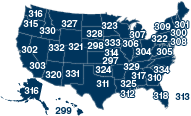Postal Unions Respond to Budget Proposal
The presidents of the four postal employee unions—NALC, APWU, NRLCA and NPMHU—wrote a letter to House Oversight and Government Reform Committee Chairman Darrell Issa (R-CA) and Ranking Member Elijah Cummings (D-MD) to share the unions’ views on President Obama’s budget proposals for 2015. Excerpts highlighting the Unions’ collective objections are captioned below.
“We strongly oppose major elements of the Administration's proposed reforms as outdated and counterproductive to the goal of strengthening the Postal Service for the 21st Century. The USPS has strongly recovered over the past 18 months as the economy has bounced back and the e-commerce boom has gathered pace. In the absence of the prefunding burden, the Service was profitable in 2013. Reducing deliveries and slashing the quality of service never made sense as a business strategy. Market research conducted by Opinion Research Corporation for USPS found that service cuts (ending Sat. service, etc.) would cause mail volume to fall by 7.7% and reduce revenue by nearly $5.3 billion -that is, by more than it would reduce costs. Now that the USPS is recovering and has eliminated some 75,000 career jobs since 2011, slashing service further makes even less sense…
• Simply re-amortizing the disastrous retiree health pre-funding mandate that was enacted in 2006, and which accounts for more than 80% of the Postal Service's losses since 2007, is totally unacceptable. "Kicking the can down the road" is not a solution to the Postal Service's most pressing financial problem. The payments are unaffordable now; they will be unaffordable two years from now…
* * *
Congress should either implement the recommendations of the Postal Regulatory Commission's independent audit of the postal CSRS account (Report on CSRS Pension Allocation Principles, Segal Company, November 22, 2010) or adopt FEHBP reforms that will reduce postal retiree health benefit costs…
* * *
The administration's proposal to allow the Postal Service to eliminate Saturday delivery was not developed after an independent analysis - it was driven by misleading data presented by the Postal Service to the PRC and accepted as part of the Cantor-Biden budget talks in 2011 aimed at reducing the budget deficit. It has shown up in every administration budget since then. Given that the Postal Service receives no taxpayer subsidy, we have always rejected service cuts aimed at improving the federal deficit measured on a unified basis.
But more importantly, it defies business sense. Saturday delivery makes the USPS unique in the delivery industry. American businesses operate 24 hours a day, seven days a week and more than a third of the Postal Service's customers say they want Saturday service. The Postal Service of the 21st Century must meet these business demands and many customers, like Amazon.com, have already begun to partner with the Postal Service to provide seven-day delivery. The ability of USPS to provide this service at very affordable rates is made possible by the Postal Service's shared networks for letter, flats, books, magazines and parcels.
Granting the Postal Service the right to end Saturday delivery, which it has advocated since 2009 during the panic of the global financial crisis, would eliminate 81,000 jobs. Congress should not sacrifice these jobs or risk the long-term survival of the Postal Service.
• The administration proposal to allow the USPS to phase out door-to-door delivery would severely damage the Postal Service's business, by severing the revenue-generating relationship letter carriers have with millions of small businesses and home-based merchants and enterprises…
* * *
The administration offered some modestly positive proposals in its budget too, for which we are grateful. Mandating the use of postal-specific assumptions to fairly calculate the surplus in the postal account in FERS makes sense - returning the surplus to the USPS would allow it to make much-needed investments in new vehicles and new technology…
* * *
We also support measures to free the Postal Service to offer new services that will generate new revenues to support universal service. The administration's proposals to allow the Postal Service to deliver beer and wine through the mail and to collaborate with state and local governments to provide their services through the postal service's retail network offer a good start on such measures.
* * *
The administration proposal to make the exigent case permanent is acceptable, though we note there are other pricing reforms that may make more business sense. Our unions remain open to exploring alternative reforms with Congress and the mailing industry that will strengthen the Postal Service, not weaken it.
* * *
Rather than slashing services in a way that will drive business away, it's time for sensible, targeted reforms that will free the Postal Service to innovate and grow. These reforms should include a permanent fix to the pre-funding burden as suggested above, the fair calculation of postal pension surpluses, suitable pricing reforms and new freedom to offer services through our existing networks to meet unmet public needs. These reforms would allow the Postal Service to do what our founding fathers intended when they established the Post Office in our Constitution: To bind the nation together and to adapt to meet the evolving needs of America's citizens and businesses.”
Follow this link to view a pdf copy of the April 14, 2014 letter.
